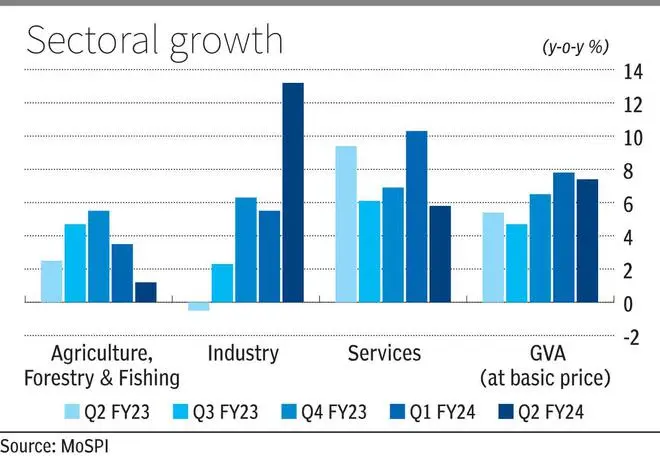India consolidated its position as the fastest-growing major economy globally as the Government’s Statistics office on Thursday released the Gross Domestic Product (GDP) data for second quarter spanning July to September months of the financial year 2023-24.
The data showed that Indian economy has grown by 7.6 per cent during Q2 FY24 mainly on account of strong performance by industries. It is much higher than the projection of the Reserve Bank of India’s Monetary Policy Committee (MPC) last month. Economic growth rate based on changes in GDP was 7.8 per cent in April-June quarter (Q1 of FY24) and 6.3 per cent of July period of FY23.
The government said it will stick to its full year projection of 6.5 per cent for now but indicated there could be an upward revision. “The GDP growth numbers for Q2 display the resilience and strength of the Indian economy in the midst of such testing times globally. We are committed to ensuring fast paced growth to create more opportunities, rapid eradication of poverty and improving ‘Ease of Living’ for our people,” Prime Minister Narendra Modi said in a tweet.
Chief Economic Advisor V Anantha Nageswaran said that these numbers impart a certain upside to the 6.5 per cent estimate for real GDP growth in the current financial year. “We will have to work the numbers to see what kind of upside the current numbers impart for the full year estimate. Until then, we will keep the estimate at six and a half per cent except we are signaling that we are now probably more comfortable with this number than we were before,” he said.
Agri, services
However, data showed that agriculture and services have slowed down. Uneven movement of monsoon could be responsible for the slowdown in the farm sector.
Explaining the trend, Sunil Kumar Sinha, Principal Economist & Paras Jasrai, Senior Analyst with India Ratings & Research, said that agricultural sector witnessed the slowest growth in 18 quarters in 2QFY24 indicative of the lacklustre kharif sowing season which was impacted by the advent of El-Nino.

The below par growth in the agriculture sector implies that the rural demand is under stress which is preventing the consumption demand to be broad-based. “The growth of the trade, hotels, transport, communication and services related to broadcasting (4.3 per cent y-o-y) and financial services (6 per cent y-o-y) pulled down the services sector growth to a six-quarter low in 2QFY24,” said Sinha in a note.
Moderation seen
Economists predicted some moderation in the next quarters while still holding yearly growth to be higher. DK Srivastava, Chief Policy Advisor, EY India, said: “The 2QFY24 real GDP growth at 7.6 per cent confirms that the Indian economy is well on course to meet, if not exceed, the annual growth target for FY24 at 6.5 per cent as projected by the RBI earlier in October 2023.”
Swati Arora, Economist with HDFC Bank, said, “heading into October-March (H2 FY24), we expect GDP growth to moderate on an annualised basis due to waning support from favourable base. However, on a sequential basis, we expect an uptick both in Q3 and Q4.” Further, she said she expects the RBI to sound hawkish in its upcoming policy and revise up GDP growth by 20-30 bps for FY24.
Dharmakirti Joshi, Chief Economist with Crisil, said he expects growth to moderate in the second half due to multiple factors – deepening global slowdown; the lagged impact of domestic rate hikes manifesting fully through the second half of this fiscal; and erratic weather and an El Niño event creating some downside to agricultural growth prospects. The advance estimates from Ministry of Agriculture peg kharif production at 4.6 per cent lower than last year. “Despite moderation in the second half, India is expected to outperform other large economies this fiscal year,” he said.




Comments
Comments have to be in English, and in full sentences. They cannot be abusive or personal. Please abide by our community guidelines for posting your comments.
We have migrated to a new commenting platform. If you are already a registered user of TheHindu Businessline and logged in, you may continue to engage with our articles. If you do not have an account please register and login to post comments. Users can access their older comments by logging into their accounts on Vuukle.